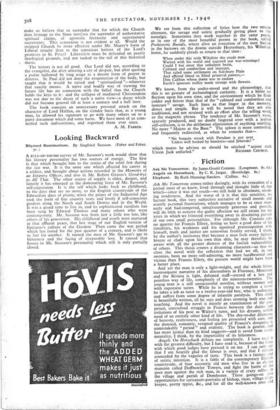The Church in the World
The Betrayal of Christ by the Churches. By J. Middleton Murry. (Andrew Dakers. is.)
THIS book contains several theses twisted together without any genuine connexion The valuable part is a moving indictment of the Christian Church for failing in her duty to the poor. This is not simply through a lack of zeal in running slum parishes, but through the deeper sin of preferring privilege and possession to the full discharge of her mission. The Church thinks of the defence of the Church, not of the happiness of the poor. Mr. Murry traces the growth of the dilemma between these alterna- tives. From ancient into mediaeval times the Church became more and more secularised : from being a spiritual authority she became a super-State. For a while this development was justified by its fruits, for the Church had a true mission to re-civilise the world as well as to convert it. The civilising done, men revolted against a tyrant Church, fabulously rich and no longer justified by benefits conferred. The Church ceased to be able to impose herself by her own authority and for her own ends. What then should she do? Borrow power from the State, at the price of subserving political ends, and lose her Christian character: or let herse:f be stripped to the skin, and, whatever the State did to her, appeal to the heart of the masses with a gospel of equality and true humanism? Since the Reformation, the Church has faced the dilemma several times, but always chosen the former ignoble alternative. For, whether the Church is established or not, if she holds property and privilege by the goodwill of the
ruling classes, her freedom of them is a pretence: she cannot bite the hand that feeds. As the State becomes more frankly materialistic, more totalitarian and more inhuman, the dilemma becomes more and more evident, the false choice more and more scandalous, and war brings the ultimate absurdity. The Church must hallow the warlike crusade of her own nation, instead of interpreting the war—inevitable though that war may be—as the judgement of God on the rottenness of the whole international system which breeds it. The Church has had and lost her last chance: the true Christian must go with Mr. Murry into the wilderness. So far so good : that the Church ought to be stripped and will in fact be stripped of property and political support is a very tenable thesis. But this thesis has nothing to do with the theological conclusions Mr. Murry tacks on to it. He would make us believe that to surrender that for which the Church does homage to the State involves the surrender of authoritative spiritual claims, of apostolic hierarchy and supernatural sacraments. This connexion is not evident at all. Would the stripped Church be more effective under Mr. Murry's form of Liberal tenuity than as the conscious heiress of the Lord's promises to St. Peter? Liberalism must be defended on purely theological grounds, and not tacked to the tail of this historical thesis.
The history is not all good. Our Lord did not, according to the evangelist, die after uttering a cry of despair, but after quoting a psalm hallowed by long usage as a decent form of prayer in distress. St. Paul did not deny the resurrection of the body, but taught that it would be raised and " spiritualised "—whatever that exactly means. A naïve and bodily way of viewing the future life has no connexion with the belief that the Church holds the keys to it : and the collapse of mediaeval Christendom was not due to the decay of such a naive view—a decay which did not become general till at least a century and a half later.
The book contains an unnecessary personal attack on the character of Lord Halifax, on the slender basis that, as a young man, he allowed his signature to go with many others on to a party document which did some harm. We have most of us com- mitted such indiscretions, and regretted them ever since.
A. M. FARRER.



























 Previous page
Previous page